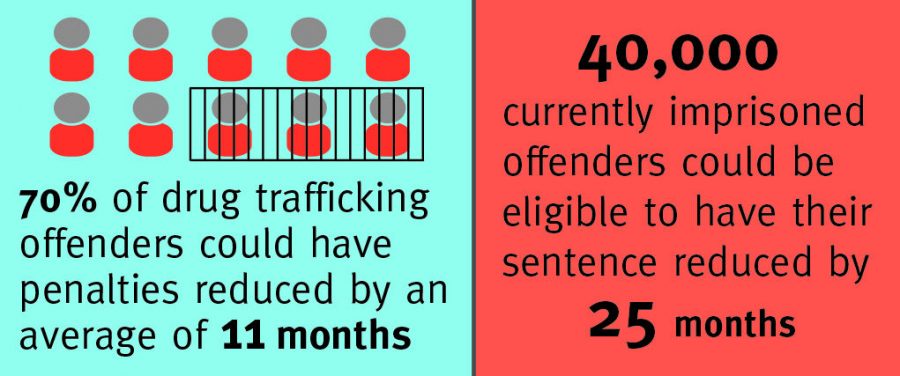Newly reduced sentences for drug trafficking offenders in US
Prison graphic
November 9, 2015
A total of 831 Illinois prisoners have been granted motions for reduced sentences due to recent changes in penalties for nonviolent drug trafficking offenders that have been incorporated into federal sentencing guidelines, according to U.S. Sentencing Commission documents from October.
A July 18, 2014, news release from the U.S. Sentencing Commission stated the vote to amend the guidelines was unanimous and will alter sentencing guidelines so that nonviolent federal drug trafficking offenders could be eligible for reduced sentences starting this month.
“This amendment received unanimous support from Commissioners because it is a measured approach,” said Judge Patti B. Saris, chair of the Commission, in the July 18 press release. “It reduces prison costs and populations and responds to statutory and guidelines changes since the drug guidelines were initially developed, while safeguarding public safety.”
Bennie Holman, chief operating officer at Community Assistance Programs, 11717 S. Halsted St., said his nonprofit employment agency works with at-risk youth, as well as ex-offenders, by offering job training and placement assistance.
Holman said he expects more people will seek help from the program as early as the next few weeks because of the motion.
The program’s job readiness training includes a series of classes designed to help people transition from joblessness or incarceration to a work environment, Holman said.
After the training, the employment agency offers subsidized job training through its partnerships with established companies and businesses. Holman said the agency works to place clients in areas they are interested in.
“We do a try-before-you-buy type of program,” Holman said. “[Clients] go and work for the employer for a specific amount of time and we will pay them, so the employer gets to know the employee as well as the employee gets experience by working on
the job.”
According to a memorandum released July 25, 2014, by the U.S. Sentencing Commission, a projected total of 36,000 prisoners will be released within the next five years, and 9,350 prisoners are projected to be released after five years.
“I would tell [people recently released from prison] to speak to their caseworker or parole officer and come for a referral to come to the Community Assistance Program and from there we can help them. Even if they do not qualify for our programs we can point them in the right direction,” Holman said.
Michael Santos, who served 26 years in prison after being convicted for trafficking cocaine, now works as a prison consultant in California helping people across the country prepare for their time in prison.
Santos also hosts a podcast called “Earning Freedom,” which he uses as a platform to speak to formerly incarcerated people who became successful after leaving prison.
Santos said his podcast can be a resource for people aiming for success after prison.
“I think it’s a great start, and I think we can go a lot further,” Santos said about the reduction of sentences for nonviolent
drug traffickers.
He said emerging from prison and rejoining society is difficult but possible and advises self-discipline, cutting ties with people who are participating in criminal activity and focusing on the future.
“They will face challenges with networking and if they are not very well prepared, they will face challenges in explaining their past in a manner that society will be able to digest,” Santos said. “Many people learn how to live in prison, and the longer they learn to live in prison, the more challenges you have learning to adjust in society.”
For more information on services available to former prisoners who need help finding work, visit CapsInc.org.








